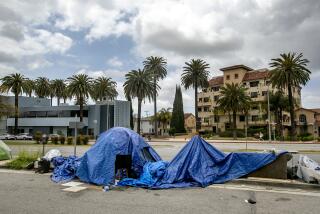Entrepreneur Stares Down Wolf at the Door : Marketing: Food was low, rent was due but cellular firm’s chief had an idea and backing of his wife and seven children.
- Share via
DANVILLE, Calif. — It was a bleak February night, and struggling inventor Scott McGregor was losing faith. The rent was due, investors were nowhere to be found and food was running low.
He gathered his family of nine and asked: Should he get a job, any job, to keep them off welfare? Or should he pursue his dream of hitting it big with a cellular phone innovation?
“Keep going,” they said.
McGregor believes that night four years ago was the turning point in his journey from poverty to prosperity, a story of how to succeed in business by trying, trying and trying again.
Today, as head of Telemac, a cellular telecommunications firm which now has about two dozen employees and offices in Venezuela, Colombia and Ecuador, McGregor, 50, can smile as he looks back. He can even laugh, albeit ruefully, about the day he drove across town to make sure no one he knew saw him buying groceries with food stamps.
“I’ve been down and out. I’ve been up and down. I’ve been everything,” he says.
From the beginning, it was clear that the Utah-born McGregor’s path to success would be rough. The night he decided to start his own company, he and his wife were involved in a serious auto crash.
Once recovered, they moved to California and, with a partner, McGregor started a cellular rental firm in 1987. Two years later, he was broke, the result of a merger that went sour.
He decided to start over, this time with a new idea.
During his days in the rental business, he had discovered that one of the industry’s biggest problems was an inability to get instant readouts of calls made on rented phones. Companies would bill for total minutes used, but couldn’t provide a breakdown until the information was processed through a central office, long after the rental customer was gone. The result was unhappy customers who often challenged their bills.
McGregor had an idea that the right combination of clock, phone and computer could fix that problem. He thought his son Greg, a computer whiz, was the person to build the system.
Starting in October, 1989, he began working 18-hour days, trying to attract investors. No one was interested.
“The two things that really saved our bacon is AT&T; never cut off our long distance and Chevron never canceled our Chevron card,” he said. When they ran out of money, the family bought food off the snack racks at the gas station.
“It was scary. It was not a nutritious time,” he said.
In mid-February, 1990, came the family conference and the decision to press on.
Lowell M. Snowe, a Salt Lake City attorney and lifelong friend, remembers telling McGregor “he’d make it if he really wanted to, if he’d hang on.”
“It’s really a great all-American story,” said Snowe, now a member of Telemac’s board of directors.
Roberto Fuenzalida, a friend and mechanic who kept the McGregors’ vehicles running on account, was another believer. “Even when he was down, he still (would) laugh and say, ‘No, I’m coming out of this,’ ” he said.
The worst stretch lasted about five months, including a two-week stint on food stamps in March, 1990, when the Chevron card was finally canceled.
“I felt like such a failure because I could not pull it together,” McGregor said.
Then came a Sunday night when the McGregors’ wobbly finances were about to fall flat. They had a notice to vacate their rented house by morning and the utilities were to be shut off.
At 11 p.m., an investor came through.
“It sounds like literary license, but it was actually, legitimately the truth,” McGregor said. “Luckily, they wired the money the way they said they would, so the checks got paid and away we started.”
At first, McGregor concentrated on renting phones as Greg, then a student at UC Davis, kept working on the tracking gadget, eventually known as TRAC, or Telemac Rental Accounting Cellular system.
But in May, 1991, disaster struck--again.
An investor’s check for $50,000 bounced, leaving the McGregors $37,000 in the red. A frantic McGregor used up all his frequent flier miles to meet with the investor. He got a letter of regret, but no money.
McGregor remembers walking out of the office in a daze.
“We were out of business. We were over with. We were dead,” he said.
Distraught, he called a friend, who suggested asking customers to invest. He had one only customer, BellSouth of Atlanta, so he called them. Surprisingly, they not only were willing to help, they had heard about TRAC and asked for a demonstration.
Only one problem--the system wasn’t ready. In fact, McGregor had not seen it at all. But Greg McGregor built it in between studying for finals while McGregor begged and borrowed two plane tickets for the trip to Atlanta.
“It wasn’t but a few days later that we had a $55,000 check from Bell South and that started us over,” he said. “We’ve never really looked back since.”
Today, TRAC, a patented system, is used by several companies, including American Cellular Rental, based in Fort Lauderdale, Fla.
“It was the TRAC system that was the clincher for us to even start a business, because without the detailed billing capability it’s just very hard to even market our service,” said marketing director Gina Jay.
Telemac has a second innovation, a system called TAPS, Telemac Automated Programming System. TAPS programs cellular phones before they go on store shelves, cutting the ready-to-use time from hours to minutes.
Telemac, which has about two dozen employees, is a family affair.
Wife Diane is chief operating officer, Greg is vice president in charge of engineering, twin sons Chris and Travis are in charge of software and hardware respectively, and daughter Caroline is director of operations. Three younger children, Sally, Tim and Jill sometimes work part time.
The family recently took a trip to celebrate their success, and McGregor is expanding his suite of offices in a business park in Danville, about 30 miles east of San Francisco.
But there haven’t been many splurges, partly because of the memory of the lean years.
“People love our products and I’m so proud of them I feel good about that,” he said, “but every single day of my life I’m scared to death.”
More to Read
Inside the business of entertainment
The Wide Shot brings you news, analysis and insights on everything from streaming wars to production — and what it all means for the future.
You may occasionally receive promotional content from the Los Angeles Times.










